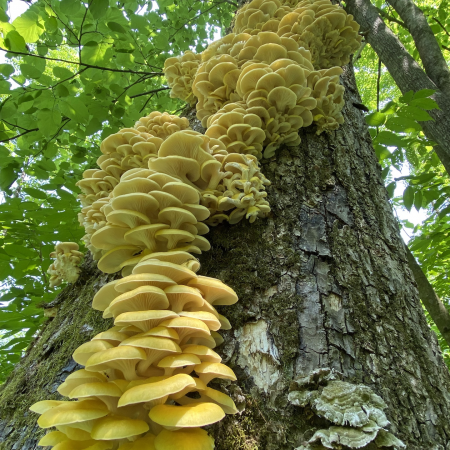The Metro: Golden oyster mushrooms are edible, invasive and spreading in Michigan forests
Findings from a new study by researches at the Pringle Lab at the University of Wisconsin-Madison find that invasive golden oyster mushrooms are reducing fungal diversity. The study, published in the journal Current Biology, found that the invasive mushroom is out-competing other fungi in fallen logs and dead trees.
Native to Asia and Russia, golden oysters have been found throughout Wisconsin and Michigan, including in Michigan’s upper peninsula.
Foraging and growing exotic mushrooms are popular ways to bring nutrition and flavor into your kitchen. Commercial growing operations are another way that mushrooms can spread from contained to wild environments.
Aishwarya Veerabahu is a PhD student in Botany at the Pringle Lab at the University of Wisconsin-Madison and leads a community data-gathering project. She is encouraging citizen scientists to send samples of golden oyster mushrooms to the Pringle Lab in Wisconsin. Veerabahu joined The Metro to explain how the spread of the golden oyster mushroom is threatening biodiversity in Michigan.
Subscribe to The Metro on Apple Podcasts, Spotify, NPR.org or wherever you get your podcasts.
Listen to The Metro weekdays from 10 a.m. to noon ET on 101.9 FM and streaming on demand.
Trusted, accurate, up-to-date.
WDET strives to make our journalism accessible to everyone. As a public media institution, we maintain our journalistic integrity through independent support from readers like you. If you value WDET as your source of news, music and conversation, please make a gift today.Donate today »
More stories from The Metro
The post The Metro: Golden oyster mushrooms are edible, invasive and spreading in Michigan forests appeared first on WDET 101.9 FM.



